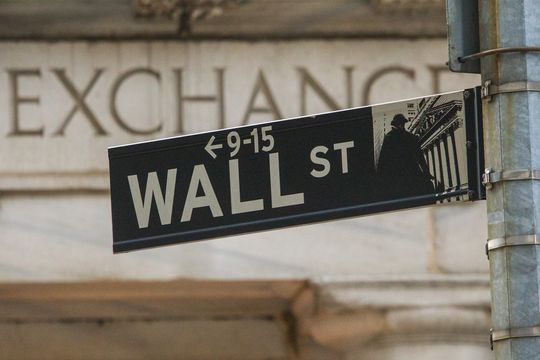Dow closes below 50-day moving average
U.S. stocks finished lower on Thursday, extending the losing streak to a third session as rising bond yields spurred weakness in some of the so-called Magnificent Seven megacap technology stocks.
How stocks traded
- The S&P 500 was down 33.97 points, or 0.8%, to end at 4,370.36
- The Dow Jones Industrial Average dropped 290.91 points, or 0.8%, to finish at 34,474.83. The blue-chip gauge ended below its 50-day moving average for the first time since early June, according to Dow Jones Market Data.
- The Nasdaq Composite fell by 157.70 points, or 1.2%, ending at 13,316.93.
The three major U.S. stock indexes extended a losing streak to a third straight session as they headed for another week in the red. The S&P 500 hasn’t fallen for three weeks in a row since February, FactSet data show.
What drove markets
While second quarter corporate earnings have largely beaten estimates, higher bond yields have undermined the value of megacap technology stocks in particular in recent weeks.
Long-dated Treasury yields rose again Thursday, with the 10-year yield up 4.9 basis points to 4.307%. It finished at its highest level since Nov. 7, 2007. The yield on the 30-year Treasury bond rose 5.2 basis points to 4.411%, closing at the highest for the 30-year rate since April 28, 2011, according to Dow Jones Market Data.
“The stronger-than-expected economic data is certainly helping push yields higher, but there’s a perfect storm with the Fitch downgrade, with the Bank of Japan’s policy decisions changes, and with the bottoming and ticking back higher in inflation that we’re seeing in the last inflation report,” said John Luke Tyner, portfolio manager and fixed-income analyst at Aptus Capital Advisors.
The Federal Reserve Bank of Cleveland’s model for forecasting near-term inflation readings on Thursday saw headline CPI rising by 3.8% in August from a year earlier and 0.8% on a monthly basis. That is above July’s 3.2% yearly increase and 0.2% of monthly gains.
Despite the fact that such inflation “nowcasts” have tended to overestimate inflation in recent months, it is “likely to put the Fed in the spot where they might have to raise rates again,” Tyner told MarketWatch in a phone interview.
However, Fed funds futures traders are pricing in an 88.5% probability that the Fed will leave interest rates unchanged at a range of 5.25%-5.5% on Sept. 20, according to the CME FedWatch Tool. The chance of a 25-basis-point rate hike to a range of 5.5%-5.75% at the subsequent meeting in November is priced at 37%.
“I think the likelihood of another hike in September is higher than what the market is currently reading,” Tyner said. “I’m sure that people want to hear what Chairman Powell is gonna say at Jackson Hole next week. They want to see more labor reports that are coming out the next month or two.”
Minutes from the Federal Reserve’s July meeting released Wednesday afternoon were being blamed for the latest leg higher in global bond yields. They showed that Fed policy makers could continue raising interest rates amid concerns that inflation could reaccelerate, potentially pushing bond yields even higher.
“It’s really uncertain where terminal interest rates will land given the economy isn’t giving us a decisive picture of being too strong or too weak. It’s keeping the window open for more rate hikes potentially,” said Mohannad Aama, a portfolio manager at Beam Capital Management, during a phone interview with MarketWatch.
The elite group of megacap tech stocks which also includes Amazon.com Inc. AMZN, Meta Platforms Corp. META and Alphabet Inc.’s Class A GOOGL and Class C GOOG shares has been credited with driving much of the Nasdaq Composite’s nearly 30% run-up year-to-date. However, their market dominance has faded in recent weeks as investors have favored other cyclical sectors like energy and materials stocks. The energy sector was the only performer ending in the green on the S&P 500 on Thursday, up 1.1%, according to FactSet data.
“That’s a theme that’s been bubbling up here over the last three to four weeks, but there’s more of an exclamation point on it now,” said David Keller, chief market strategist at Stockcharts.com, during a phone interview with MarketWatch.
Keller added that rising bond yields tend to have a bigger impact on growth stocks like technology names, while sectors like energy are more resilient. “Energy can do just fine in a rising rate environment. energy and materials should probably do better in a relative basis,” he said.
Corporate earnings were also in focus Thursday as investors received results from Cisco Systems CSCO and retail giant Walmart Inc. WMT. Cisco reported strong quarterly results after Wednesday’s close. Walmart also reported stronger than expected earnings, helping to offset some concerns about the strength of the consumer spurred by Target Corp.’s TGT lackluster earnings and guidance from Wednesday. Shares of Cisco rose 3.3%, while Walmart shares ended 2.2% lower.
In U.S. economic data, first-time jobless-benefit claims fell by 11,000 to 239,000 last week, a sign that layoffs in the U.S. labor market remain low. The Philadelphia Fed factory index also shot higher to 12 in August, up from negative 13.5 during the prior month, a sign that manufacturers in the U.S. could be exiting a slump.
Companies in focus
- Hawaiian Electric Industries Inc. HE shares finished 15.3% lower on Thursday after The Wall Street Journal reported that the utility has engaged in talks with restructuring advisers to consider its next steps after the deadly Maui wildfires.
- Shares of Ball Corp. BALL rose 1.6% after agreeing to sell its aerospace unit to BAE Systems for $5.5 billion.
- Chesapeake Energy Corp. CHK will replace Mercury Systems Inc. MRCY on the S&P MidCap 400, S&P Dow Jones Indices said on Wednesday. Shares of Chesapeake were up 4.4%.
- Shares of Cigna Group CI and CVS Health CVS dropped 6.4% and 8.1%, respectively, following a report that a major nonprofit health insurer was preparing to shun the pharmacy-benefit industry.

